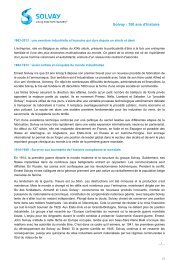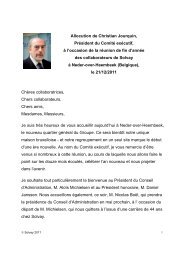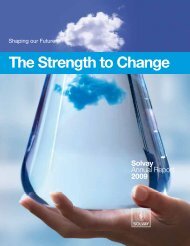Financial Statements - Solvay
Financial Statements - Solvay
Financial Statements - Solvay
Create successful ePaper yourself
Turn your PDF publications into a flip-book with our unique Google optimized e-Paper software.
natural resources and limit waste<br />
disposal. New applications are also<br />
being developed in nutrition, human<br />
health and agriculture. To meet<br />
these demands, capacity has been<br />
increased at the Torrelavega (Spain)<br />
plant and a new production unit is<br />
under construction at Rosignano<br />
(Italy), coming on line in 2009.<br />
The new unit producing calcium<br />
chloride pearls was successfully<br />
brought into service at Rosignano at<br />
the end of 2007. The initial capacity of<br />
60 kt/year will gradually be increased<br />
to 140 kt/year to meet growing<br />
demand.<br />
In Advanced Functional Minerals<br />
the redeployment of our activities<br />
is continuing, including certain<br />
divestments. In this context the<br />
Precipitated Calcium Carbonate<br />
activity, of limited strategic interest for<br />
the Group, has been put up for sale.<br />
Five European sites are involved.<br />
At the same time, the 75/25 <strong>Solvay</strong>-<br />
CPC joint venture closed its Reynosa,<br />
Mexico, strontium carbonate<br />
production site.<br />
2009 will be a diffi cult year, but we<br />
are continuing our commercial policy<br />
of raising our prices. In particuliar<br />
soda ash and in “green” markets like<br />
glass for renovating and improving<br />
building insulation and for solar panel<br />
supports, in which <strong>Solvay</strong> has a<br />
signifi cant presence, should remain<br />
growth segments. Applications<br />
involving sodium bicarbonate should<br />
continue to grow, in particular in the<br />
environmental fi eld.<br />
The Electrochemistry<br />
and Fluorinated Products<br />
cluster<br />
Demand for Caustic Soda was<br />
stable, with sales remaining buoyant<br />
until the end of the third quarter of<br />
2008. Lower fourth-quarter sales<br />
refl ect the fall in production of chlorine<br />
and its co-product, caustic soda,<br />
due in particular to falling demand for<br />
PVC from the building construction<br />
industry. Rising energy prices had<br />
a very signifi cant impact on the<br />
operating costs of our electrolysis<br />
units. Finally, 2008 saw a very sharp<br />
rise in caustic soda prices, by over<br />
50% in the second half in Europe<br />
and Mercosur, refl ecting both a tight<br />
supply situation and sharp increases<br />
in the cost of electrical energy.<br />
In 2008 we brought online our<br />
membrane electrolysis unit at Bussi<br />
(Italy). This refl ects our strategic<br />
choice of gradually replacing our<br />
mercury electrolysis units with<br />
membrane ones and of supporting<br />
this sustainable process which saves<br />
water and energy and produces fewer<br />
by-products. At the end of 2008 it<br />
was also decided to convert part of<br />
the electrolysis facility at Tavaux from<br />
mercury to membrane technology.<br />
Again with the objective of sustainable,<br />
profi table growth, <strong>Solvay</strong><br />
participates in Exeltium, an industrial<br />
consortium of major electricity<br />
consumers in France, to ensure<br />
stable energy supplies at more<br />
competitive prices.<br />
In Allyls, demand for epichlorohydrin<br />
dropped sharply at the end of the<br />
year and market conditions have<br />
become very diffi cult. In the long<br />
term, we remain confi dent that<br />
demand will pick up, linked to growth<br />
in epoxy resins, which in particular<br />
are gradually replacing steel in the<br />
automotive and aviation industries,<br />
and which are a major component<br />
in most fi bre-based composite<br />
structures. All these applications<br />
mean weight reductions and energy<br />
savings.<br />
Epichlorohydrin production using the<br />
EPICEROL ® process has become one<br />
of the Group’s fl agship processes.<br />
The use of natural glycerine, a<br />
co-product of the production of<br />
biodiesel, as a raw material and the<br />
major reduction in by-products and<br />
waste are concrete expression of our<br />
desire to reduce our industrial impact<br />
on the environment.<br />
Chemicals Sector<br />
33<br />
<strong>Solvay</strong> Global Annual Report 2008<br />
Chemicals Sector


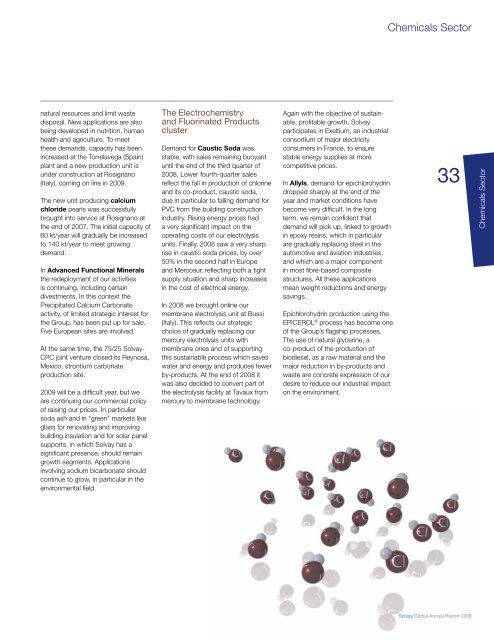

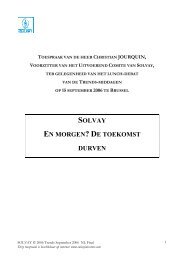
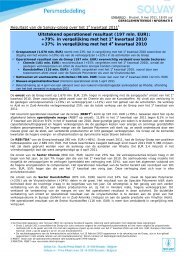
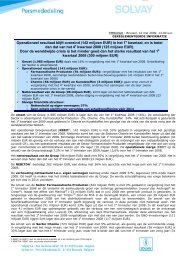

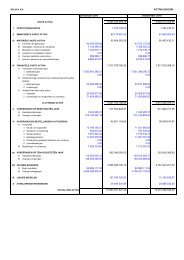
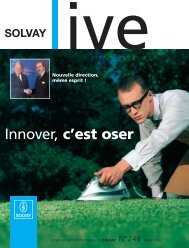
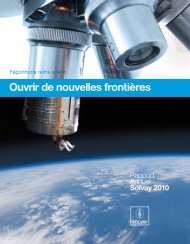
![PROC.1 [LETTRE] - Solvay](https://img.yumpu.com/16585746/1/184x260/proc1-lettre-solvay.jpg?quality=85)
